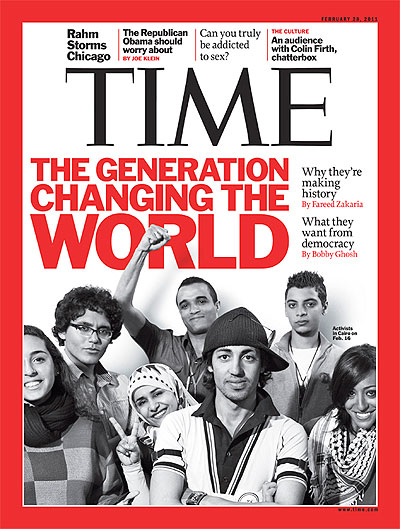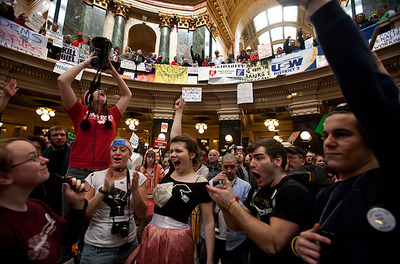March 7, 2011
3 Media Narratives About The Middle East You Should Defend Against

if you're watching it, it's for you
(that's why the signs are in English)
(that's why the signs are in English)
1. Youth In Revolt

Ha! That's hilarious. Wait-- you're serious? You know Jay-Z is 40, right?
According to Time, these are the guys who toppled Mubarak. That one guy in the back punched him and the girl poked him in the eyes. The guy in the back right ate the body.
The New Revolutionaries: a liberal, pro-democracy group of consumerists concerned equally with global warming and expressing themselves, discreetly lip-synching the words to Lose Yourself as they march on Freedom Square.
You'll have to excuse my cynicism: I've seen this exact same movie a lot of times, admittedly to a CCR soundtrack.
Of course the young(er) are looking for social changes and a better life. And I don't doubt that they at least believe themselves to be earnest. But the media narrative that it is they who are the force behind the acute changes is both wrong and manipulative.
It's manipulative because it is easy. We can understand that kids might not like the world as it is, and the youth certainly appear to have enough energy drink to march for a week straight or yell anti-Bush obscenities, so it is logical that they're the ones to focus on. It gets Time, et al, out of the hard work of trying to figure out why the revolution happened, happened now, and if it's a good thing or a bad thing. Even Obama's not sure how this plays out, so the more we hear about youthful idealism on the march, the less we have to worry that Israel doesn't first strike Iran, just in case.
Also, it's self-aggrandizing. This is the folks at Time saying, "hey, man, we get this hip generation." It makes them think they're young and in touch, ("they even figured out how to use the internet for something other than porn!") and I'd bet 10 piastres every guy working at Time thinks the girl in the bottom right would find them interesting.
The narrative is wrong, or at least woefully inadequate, because-- in the simplest terms possible-- the guys in the picture aren't the ones changing the world. I'm sure they'd have thought voting for Obama was going to bring change, too, but they'd have been way wrong about that as well.
Here are some sobering statistics for the Time readers. There are 80M people in Egypt, 10% unemployment and 40% in poverty, as defined as less than $2/day. About a third don't know how to read. None of those people are in the picture. None of those people want the same things as those in the picture. None of them will ever listen to those in the picture.
There may have been 100k students in that Square, but if their 50 year olds are anything like our 50 year olds, then their 50 year olds might actually find those students infuriatingly arrogant regardless of what side they're on.
The sad truth is revolutions start with the disenfranchised, get attributed to the idealism of "students" and "the youth," and are ultimately resolved by thugs or corporations. Sideways Glasses Guy is in for a jarring quarter-life lesson in economic history, and I'm guessing he's not going to pass.
1b. The Young Are Mad As Hell, And They're Not Going To Take It Anymore. Sorta.
In the next issue of Time after that one, I found this picture of the Wisconsin union protests (click to enlarge):

Some observations:
1. Look at the crowd in the background. They're all older people. But Time has put the young ones front and center.
2. They do not appear to be members of the teacher's union. Or particularly fond of teachers.
3. They are smiling.
They're not angry, they're not outraged, they're... socially conscious? I'd bet a lot of money those kids aren't there to support the unions, that's not exactly their fight, but that fight happens to have a common enemy (feel free to speculate who that common enemy might be.) This explains precisely what is wrong with so many fights and positions and ideals: they are not for something, but against something else.
"What's wrong with coming out in support?" Well, go ahead and ask Time: "what's wrong with putting them front and center?" Because if I was agnostic about unions, and interested in really deciding who I supported in this fight, one look at that picture guarantees I side with whoever they're yelling at. If you want to know exactly what is wrong with the "political discourse in America today," it's that we are trained to pick a side against something we hate.
So choose your "face of the revolution" carefully because if it's an emotional response you are trying to evoke, there may be some unintended consequences. That's what happened in the 60s, too-- Woodstock the revolution and you landslide in Richard Nixon with a victory margin 3 times higher than Obama's. Guess music can't change the world after all.
2. The Mad Dictator That Has To Go

Oh, he may be a nutjob, but once he's out-- what, exactly? He's not a lone nutjob. There was an entire government in place there and while they don't all have voluptuous nurses you can be damn sure they want voluptuous nurses, and if they can't get that they'll settle for all your money and your obedience.
It's a narrative that existed long before the nights of Saddam, get rid of the dictator and things will get better. Sometimes it works, sometimes it doesn't, and if your country has oil in it it usually doesn't.
 yes, Mr. President, I'm going to get a haircut and try and ride this one out
yes, Mr. President, I'm going to get a haircut and try and ride this one outImagine you replaced George Bush with Obama, but kept Cheney and Rumsfeld, Wolfowitz, Pearle, Rice... Imagine you get rid of all the Congressmen, but kept all the lobbyists, all the civil service employees, intelligence services, all the guys previously on the take-- and the media infrastructure. "The media supports the people!" Oh, yes, that has long been my experience with media.
It's so easy to get distracted by the Evil Despot that we aren't horrified that Egypt's chaperons of future democracy are the military. Really? "They didn't turn on their own people!" Wow, that's your metric? Do you think they're just going to step aside when the kids show up to sell off the tanks to pay for education?
I am certainly in no position to decide whether you Paul Bremer everybody in a uniform or keep specific people on the payroll, but I can at least tell you this "new" government isn't going to have any room for the likes of Sideways Glasses Guy.
The best thing that can happen to him, is a long, boring, bureaucratic shuffle towards elections, because if you do them in anything less than a year the old entrenched powers will win. Or the Muslim Brotherhood, who are going to win anyway (my prediction.)
If the kid in Time wants to participate in government, he needs at least a year to get his act together, not to mention money from the U.S. (You didn't think we were going to stay out of it, did you?)
The media likes the Mad Despot narrative because, again, it's easy, but, again, it's wrong and manipulative. And it backfires. When George Bush pulled the Mad Despot card, the media reacted against it-- but that was itself a manipulation, because they wanted the Mad Despot to be Bush himself. Offered no other choices than "one of these guys is utterly, completely, evil," America was forced to choose who they thought was actually the Mad Despot; and-- tip for the media-- most Americans will think it's the foreign guy.
3. The Power Of Social Media
The intended subtext of this myth isn't that facebook and twitter aided people in their revolution; but that those were somehow the cause of the revolution. That the technologies themselves "need" freedom, they force freedom, they cause freedom, by their very existence.
This is a letter to Time:
Re: Why It's Different This Time" What we have on our hands today is not only a revolution in Egypt but also the beginning of an era when a new medium finally proves to the world its equal and comparable importance to that of the printing press. Social media are no longer just how we stalk ex-girlfriends or update the world about where we bought coffee. It fuels revolutions...
In my short time on earth, I've lived through: papyrus, morse code, radio, yelling, mobile phones, and I have only just recovered from TV. All of these "disruptive technologies" share two commonalities. First, they empowered the people to communicate, congregate, and share ideas. Second, and more importantly, all of them were eventually co-opted by the government and business to manipulate those people, who didn't mind one bit as long as the ads were under 30 seconds.
It's fairly obvious why media companies would push the idea that the media itself is responsible for puppies and Reese's Pieces cookies, but when the medium becomes the message, there's no message.
II. So What Are The Lessons Of History?
From The Economist:
In Tunisia Zine el-Abidine Ben Ali met peaceful crowds with concessions. In Egypt Hosni Mubarak tried to ride out the protests by mixing concessions with force. In Bahrain King Hamad bin Isa al-Khalifa resorted to violence, but did not have the stomach for the fight. In Libya Mr Qaddafi seems to crave blood. Screaming ghastly defiance in an hour-long tirade on February 22nd, he vowed to "cleanse Libya house by house". If he prevails, dictators the world over will know which course to follow.
Or: every time history repeats itself, the price goes up.
38 Comments